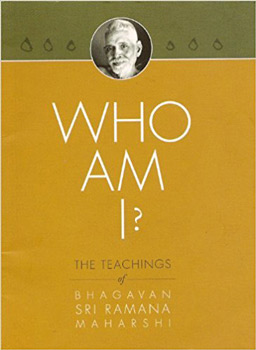As thoughtful and conscientious people, we want to live our lives well. Today I’d like to introduce a very simple technique that you can use every day. It doesn’t take any time. You can do it while driving to work, taking a shower, or washing dishes. Practicing this technique will guide you from within.
The Practice of Self-Inquiry
Self-inquiry is a mental practice of turning our attention within and asking, “Who am I?”
Before we can answer this question, however, we need to discard some wrong ideas. Any meaningful answer to the question “who am I?” can never change. It must be the same at all times and for all circumstances. And ultimately the answer must be the same for everyone.
For example, today I might answer the question with a name—Mary Jones. Next year, after my wedding, I might call myself Mary Smith. Therefore, I am not my name. The same goes for my job. I might be a computer programmer today, but perhaps I’ll get tired of that work, change careers, and become a personnel manager. But I will still be the same person. I am not my occupation.
Our personalities and preferences change over time. I once enjoyed country music, but now I like classical. I used to love chocolate, but now it gives me headaches. And of course, the body changes constantly—I used to have blonde hair, but now it’s mostly gray. My face is wrinkled where once it was smooth. Obviously I am not my personality or my body.
If I truly want to find out who I am, I need to practice self-inquiry and discard the answers that don’t fit.
Self-Inquiry: Practice or Path?
Yoga masters and scriptures emphasize the importance of inquiry. The Yoga Vāsishtha says that inquiry is one of the four gatekeepers to liberation. The others are self-control, contentment, and good company. It states these benefits of practicing inquiry:
“Knowledge of truth arises from inquiry; from such knowledge there follows tranquility in oneself; and then there arises the supreme peace that passes understanding and the ending of all sorrow.”
The Yoga Vāsishtha states that inquiry is one of several spiritual practices leading to happiness and, finally, enlightenment itself. One notable master, Ramana Maharshi of India, emphasized inquiry as a distinct path. He taught that inquiry is the primary practice on the spiritual path.
Who Am I? (aff link) is a compilation of questions and answers. At less than twenty pages long, it’s easy to read and rich with spiritual wisdom—one of those books worth returning to along one’s journey. I recommend it as a helpful guide to this practice. You may decide for yourself whether to include self-inquiry in your daily contemplation or to adopt Ramana Maharshi’s path of focused self-inquiry.
Putting Self-Inquiry into Practice
Spiritual knowledge must dawn from within. Saints, sages, and books might give us clues and even outright answers to our questions. However, they also tell us that true knowledge must be experienced.
When you meditate each day, start with a quiet moment of contemplation of the question “who am I?” Don’t try to answer the question. Just ask. Then continue with your meditation practice, being solely a witness to any passing thoughts.
Persistence is needed to make progress in any worthwhile endeavor. Over time, by practicing self-inquiry, you will realize the answer to the question “who am I?”
Chityānanda has been a disciple of Svāmī Gurupremānanda Sarasvatī since 1975. She teaches meditation and yoga as a spiritual path in Santa Cruz, California.



I’ve been thinking about this post all week. Clearly I am not my body, occupation etc – I realize I’m divine. However, do my experiences and notions, built up as life passes, contribute also to who I am?
I appreciate your question, James, and that you already know your body and occupation are not really who you are. Who is experiencing? Who is aware of thoughts such as notions? The point of practicing inquiry is to discover the answer within. I wish you well on your inner journey. Namaste.
Hello Svāmi Chityānanda.
The definition for inquiry you present is very clearcut: ‘Any meaningful answer to the question “Who am I?” can never change.’ I appreciate your precision.
I pondered your declaration about the nature of the answer to the question: “Who am I?” You say, “And ultimately the answer must be the same for everyone.”
A slightly different way to say that occurred to me, and i wonder what you think?: “The ultimate answer will be the same for everybody.”
At any rate, every physical thing I thought I knew about myself or my loved ones is being transformed—and mostly erased—by time.
In the little “Who Am I?” booklet Ramana Maharshi says we are all: that Awareness whose nature is Existence-Consciousness-Bliss. His answer is supremely satisfying. Thank you.
Hello Rob Ryan: Re. your rewrite of the statement “And ultimately the answer must be the same for everyone.” I don’t see any difference in the meaning. If you do, please explain. Thank you for reading and commenting. SCS
There is that favorite expression of mine – “persistence”. “Who am I?” A great way to think during the day, and I do this when I walk Max, my dog.
Thank you for joining the conversation, John, and for your suggestion about how we might practice the inquiry of “Who am I?” When you walk Max, I’m sure that your mind relaxes. It’s a great way to be open to the inner voice of the Self. I also appreciate your note about persistence. Another word for persistence is steadfastness–these are really important qualities on the spiritual path. Namaste.
Who am I ? Through my teachings, and conscious effort and through meditation, I am now consciously aware that I am Chiti. I continue to meditate on That, that I may be blessed with a direct experience with That.
Yes, Tosh, may you be blessed with the experience of the Divine. Namaste.
This is one of the main questions that got me started searching for a path. Who am I? Why am I here? What should I be doing? The answers to all these questions can be found with the help of the teachings here.
Thank you for telling us how significant “Who am I?” has been to you. You sound like a natural inquirer. No doubt, all your questions will be answered! Namaste.
I don’t think I’m a name, or a job, or a body. I just feel I am what I am. Am I supposed to “Realize” that I am something other than just being myself?
Good question, Modesto! It’s great that you don’t identify with name, job, or body. But what exactly do you mean by “myself”? SCS
After I first read ‘Who am I’, I made a false assumption that I needed to be a something. Reading a second time, I see the assumption was wrong. No where does the article say I must be something other than myself.
What I am is hidden in the quote, “Knowledge of truth arises from inquiry; from such knowledge there follows tranquility in oneself; and then there arises the supreme peace that passes understanding and the ending of all sorrow.”
Who I am must be a peace that passes understanding and ends all sorrow. This sounds very comforting.
Thank you for taking the time to read the post again, Modesto. And I’m so pleased to see that you’ve found the clue to eternal happiness! Namaste.
Nice article as usual.
“Who am I?” . . breathe . . “Who am I?” . . breathe . . “Whoooo?” . . (breath withdraws) . . . “I.”
Thank you for your comment and demonstration of the technique, Jack. Namaste.
As a Christmas gift, my son Donald, gave everyone the book, “Who am I” It would be worth reading it again.
Thank you for the reminder, SG. Yes, it is worth reading, and your son’s thoughtful gift is a special boon to those who received it. I hope they will take your advice. Namaste.
Who am I? “Not this. Not this”. This is a very important lesson on inquiry. It is important that I identify myself with the Conscious Witness, and not my boss and thoughts.
That’s funny, Tim. At the same moment that I sent my comment to Richard, I received yours. Please compare! Namaste.
It’s very great how you start by saying who we are not, so that the answer to who am I just about falls out on its own.
Thank you, Richard. Your comment reminds me of the Vedantic saying: “Not this, not this.” After eliminating everything that’s unreal, only the Real remains! Namaste.
Your quote, “Knowledge of truth arises from inquiry; from such knowledge there follows tranquility in oneself; and then there arises the supreme peace that passes understanding and the ending of all sorrow” is deeply appreciated. It helps to remember that tranquility follows the arising of Truth. Thank you.
You’re most welcome, Elizabeth. I’m also very fond of that quote from Yoga Vāsishtha–tranquility, the peace that passes understanding, the end of sorrow–these are wonderful motivators to keep us on the path.
Like you say, just knowing the answer does not give us the personal experience of that answer. True knowledge must be experienced. It’s good to know that this simple contemplation will at some point deliver the answer from within.
Thank you for your comment, Roxie. Yes, simple contemplation PLUS spiritual practices done with a sincere heart until the goal is met.